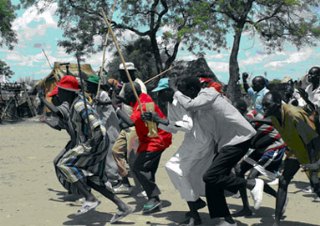Jonglei’s Pibor clashes continue – residents critical of SPLA response
December 28, 2011 (BOR) – Local officials in Pibor county say advancing Lou Nuer youth, with a weak response from the South Sudan army, took control of Likuangole payam [district] headquarters on Tuesday as the death-toll remains at 24, with five wounded and over 10,000 people displaced.

Lou Nuer youths launched several raids on villages of Likuangole payam on 23 December in what are believed by some to be revenge attacks for August raids on their villages by Murle, that left over 600 people dead.
South Sudan’s Jonglei state is home to pastoralist communities whose cattle rustling raids has been aggravated by acquisition of arms during the Sudan civil war.
An influx of South Sudanese citizens, returning home after the nation achieved statehood, has increased the demand for cattle, specifically for bride price – traditionally obligatory amongst many South Sudanese communities.
Believed to havce arrived in the 1930’s, the pastoralist Murle are relative newcomers to South Sudan. They occupy a small area of land around Pibor and parts of Ethiopia. With poor education and other facilities the prospects for many Murle are limited. Accusations of Murle cattle rustling are numerous.
Pibor officials have described the attackers as heavily armed.
Allan Kirera, the executive director of Pibor county said the attackers are heading to Pibor town.
Kirera said the SPLA forces based in Likuangole and Pibor has failed to prevent the advancement of the attackers.
Philip Aguer, the SPLA spokesperson told Sudan Tribune that, “If that brigade is unable to address the situation, then it is up to the state to ask the government of the Republic of South Sudan [for more forces] because this is how we work.”
The state government has cited lack of road network as a factor slowing down movement of police and the army.
(ST)
